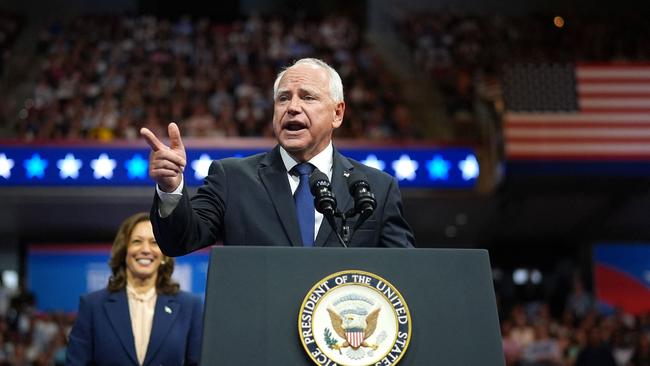Kamala Harris choice of veep a wasted opportunity
In choosing Tim Walz as her running mate, she has made the same kind of mistake as Donald Trump made with JD Vance.

Walz is the most left liberal of the small set of reassuring white guys Harris considered for her veep. He was warmly preferred and endorsed by the two most significant figures in the congressional left: Bernie Sanders and Alexandria Ocasio-Cortez.
Minnesota is indeed part of the mid-west, the key battleground where the November election will be decided.
But America is a very complex and diverse place. Minnesota is also the site of one of the deepest and longest socialist traditions in American politics. In the greatest electoral landslide in American history, in 1984, Minnesota was the only state in the union not to vote for the conservative Ronald Reagan, supporting instead Walter Mondale, who ran on a strongly left liberal policy agenda.
But Harris needs no help on her left, just as Trump needs no help on his right. Both vice-presidential picks are therefore a wasted opportunity.
Any voter who thinks of themselves as a progressive, or liberal, or regards Trump as unacceptable, offensive or too right wing is already going to vote for Harris, no matter who she has as vice- president. Similarly any voter who is strongly nationalist believes Joe Biden has made America weak, is concerned about illegal immigration et cetera, will vote for Trump, whether he has JD Vance or the man in the moon as his vice-president.
Harris may be suffering from the hubris Trump was afflicted with when he chose Vance.
Walz has been greeted enthusiastically by Democrats and the media. But Vance too was welcomed euphorically at the beginning. Both Walz and Vance will contest the mid-west, one from the left, one from the right.
But just as Trump chose to forego the legislative experience, fundraising heft and automatic Latino outreach that Florida senator Marco Rubio would have offered, so Harris ignored the obvious electoral strength of Pennsylvania Governor Josh Shapiro.
Unlike Walz, Shapiro is a notable centrist. He would have been much more likely to add votes to the Harris ticket than Walz.
Walz has been a stridently liberal governor, very slow to control the Black Lives Matter riots in Minneapolis, initially sympathetic to defund-the-police gestures, in favour of legalised cannabis, fully on board with modern Democrat gender ideology and so on.
Shapiro is Jewish and a strong supporter of Israel, though a critic of Israeli Prime Minister Benjamin Netanyahu and in support of all the Biden administration positions on the Middle East.
Trump has campaigned poorly over the past couple of weeks, but the campaign is now likely to settle down. Walz is likeable enough, as indeed is Vance. But like Vance he gives his opponents a lot of ammunition, a big target.
It’s depressing that Trump and Harris ran to their base, rather than moving to the centre.
Both Walz and Vance are mainstream figures. Neither should be demonised. But the choice of both reflects the deepening polarisation of US politics.




In choosing Minnesota Governor Tim Walz as her vice-presidential running mate, Kamala Harris has made the same kind of mistake as Donald Trump made in choosing JD Vance as his. She has doubled down on her base, rather than trying to enlarge her voting coalition.